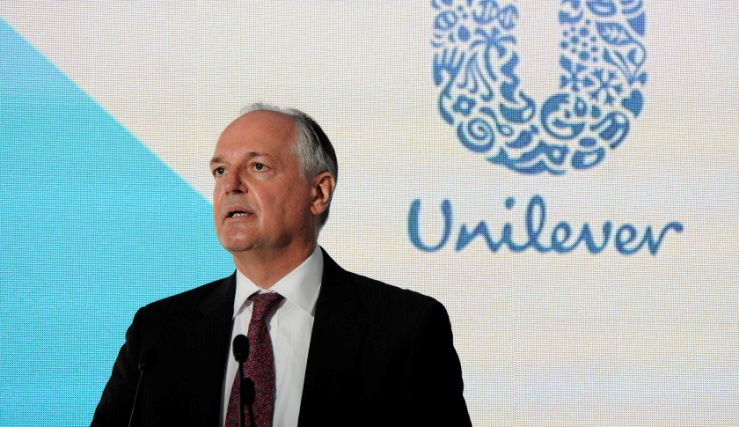(单词翻译:单击)
When LinkedIn unveiled its data-fueled list of “the most sought-after employers in the world” a few months ago, the companies at the very top of the heap came as no surprise: Google, followed by Apple.
几个月前,LinkedIn基于大量统计资料,发布了“全球最受欢迎雇主”榜单。排名最靠前的公司毫不令人意外:谷歌,随后是苹果。
But coming in at No. 3—ahead of Microsoft and Facebook—was a very different breed of business: consumer-products giant Unilever, whose Dutch roots stretch back more than 140 years.
但在微软和Facebook之上,高居第三位的却是一个完全不同类型的公司:日用消费品巨头联合利华,这家创建于荷兰的公司的历史可以追溯到140多年前。

How did that happen? CEO Paul Polman is convinced that Unilever, which draws about 2 million job applicants annually, has turned into a magnet for recruiting and retaining workers because it is considered a place of purpose.
联合利华凭什么?该公司首席执行官保罗o波尔曼认为,每年吸引约200万求职者的联合利华,仿佛就像一块吸引和留住员工的磁铁,因为这里被认为是一家目标明确的公司。
With an original vision to “make cleanliness commonplace,” Unilever has a long of history of thinking broadly about its mission. “It’s in the DNA of the company,” Polman says. But since taking the helm in 2009, he has more closely tied Unilever’s core strategy to having a positive impact on the environment and public health—and that, Polman says, is generating “enormous opportunities.”
联合利华起初的愿景是“使洁净成为寻常之事”,他们有着深入思考公司使命的悠久历史。波尔曼表示:“这是我们公司的特色。”但自从2009年接掌这家公司后,他就改变了联合利华的核心战略,致力于推动公司对环境和公共卫生产生更加积极的影响。波尔曼表示,这种战略创造了“巨大的机遇”。
Not long ago, Polman notes, the keeper of Dove, Lifebuoy, Pond’s, Lipton, Ben & Jerry’s, Hellmann’s, Knorr, and hundreds of other brands was “not on the radar screen in the U.S.” Last year, the company saw a 65% rise in job applications from American college students compared to 2013.
波尔曼指出,不久前,这家坐拥多芬、卫宝、旁氏、立顿、Ben & Jerry’s、Hellmann’s、家乐以及其他数百个品牌的公司仍“不在美国大众的视线之内。”然而到了2014年,联合利华收到的美国大学生求职申请数量比前一年提高了65%。
Meanwhile, Unilever’s employee engagement scores have climbed 12% since Polman started as CEO, according to the company. “If you peel the onion on that, it really is the pride people have,” Polman says. Putting purpose at the center of everything the corporation does is “incredibly motivating for our employees.”
与此同时,联合利华的数据显示,自从波尔曼担任首席执行官起,公司员工的敬业度评分提高了12%。波尔曼说:“就其实质而言,这说明员工们真的拥有强烈的自豪感。”公司将目标置于一切事物的最中心,这“极大地激励了我们的员工。”
This is especially the case for members of the Millennial generation, who, in the words of a study by consulting firm PwC, are eager “to contribute something to the world and … want to be proud of their employer.” Says Polman: If members of Gen Y don’t believe in what you’re doing, “they don’t want to work with you.”
对于80后和90后员工而言,情况尤其如此。用普华永道咨询公司一份研究报告中的话来说,这些年轻人迫切地“想要为世界做点什么……想要以他们的公司为傲。”波尔曼表示:如果80后和90后不认可你的做法,“他们就不想与你共事。”
None of this is shocking. “Humans, by their nature, seek purpose—to make a contribution and to be part of a cause greater and more enduring than themselves,” writes Daniel Pink in Drive: The Surprising Truth About What Motivates Us. Abraham Maslow, Douglas McGregor, Frederick Herzberg, Peter Drucker, and other great management thinkers said similar things more than half a century ago.
这一切都并不令人震惊。丹尼尔o平克在《驱动力:有关激励的惊人真相》一书中指出:“追求目标——投身于比他们自身更伟大、更持久的事业,并成为其中的一部分——是人类的天性。” 在半个多世纪之前,亚伯拉罕o马斯洛、道格拉斯o麦格雷戈、弗雷德里克o赫茨伯格和彼得o德鲁克等伟大的管理学先哲也都有过类似的说法。
So, why don’t more companies behave the way Unilever does?
那么,为什么没有更多公司仿效联合利华的做法呢?
For one, many executives underestimate how difficult it is to build this kind of culture. That doesn’t mean every company needs to make grand pronouncements like Unilever has done. (Case in point: Polman has described his company as “the world’s biggest NGO.”) Having purpose simply requires being clear about how you’re delivering value to your customers while taking responsibility for whomever and whatever you touch.
原因之一在于,许多高管低估了建立这种文化的难度。这并不意味着所有公司都要像联合利华那样发布宏伟的宣言。(一个恰当的例子是,波尔曼曾把联合利华描述为“全球最大的非营利性组织”。)拥有目标,只是要求公司清楚该如何把自己的价值观传达给顾客,并为一切接触的人和事物负责。
The problem is, many companies are fuzzy about their mission. And all too often, “corporate social responsibility” amounts to nothing more than trotting out a few empty slogans, cutting some checks for charity, holding a day of service for employees, or setting up a CSR department that has no actual input into major decisions.
问题在于,许多公司没有搞清他们的使命。太多情况下,“企业社会责任”的意义只是喊几句空洞口号,在账上拨点钱用于慈善,给员工组织一天的公益活动,或是建立一个无法对重大决策施加实质性影响的企业社会责任部门。
Unilever UN 1.35% , by contrast, rigorously measures and reports its progress against three ambitious goals it aims to reach by 2020: helping more than a billion people across the globe improve their health and well-being; halving the environmental footprint of its products; and sourcing 100% of its agricultural raw materials sustainably while enhancing the livelihoods of those working across its supply chain.
而联合利华正好相反,该公司严格地测算和报告他们准备在2020年达成的三个雄心勃勃的目标的进展情况:帮助全球10亿以上的人口提高健康和幸福水平;将公司产品对环境的负面影响减半;农业原材料要具有100%的可持续性,同时提高供应链工人的生活水平。
What’s more, the company has committed to doing all this while doubling the size of its business, to about $100 billion. (Unilever derives nearly 60% of its sales from emerging markets.)
此外,该公司还决心在做到这一切的同时,将业务规模翻番,达到1,000亿美元。(联合利华的近六成销售额来自新兴市场。)
On the ground, these objectives manifest themselves in many ways, like the recent launch of the Toilet Board Coalition, a cross-sector group that is trying to find scalable, market-based solutions to what it calls “the sanitation crisis.” Could this Unilever-led effort make a difference in the lives of the 2.5 billion people around the world who lack access to a safe, clean toilet? Quite possibly. Could it also help Unilever sell more bottles of Domestos, its bathroom germ killer? Definitely.
在实际执行中,这些目标从许多角度证明了自己的价值。比如最近成立的厕所董事会联盟。这是一个跨部门的组织,旨在寻找可扩展且基于市场的方法来解决所谓的“卫生危机”。全球目前还有多达25亿人缺乏安全且洁净的厕所,这场由联合利华发起的行动究竟能否他们的生活?很有可能。这项行动能否帮助联合利华卖出更多杀灭卫生间细菌的产品“家净”呢?绝对如此。
Using the same logic, Unilever is trying to position Knorr bouillon as a weapon to combat food insecurity; Lifebuoy, a vehicle to promote good hygiene.
秉持同样的逻辑,联合利华试图将家乐的肉汁清汤作为与食品安全问题斗争的武器,利用抗菌品牌卫宝来宣传良好的个人卫生习惯。
Making this tangible for those on the front lines isn’t easy. So, in late 2013, Unilever launched an online “Social Impact Hub” for its 174,000 employees to learn more about its myriad initiatives in this area. Unilever has also augmented its training programs so that workers at all levels can understand the company’s commitment to sustainability and how their own jobs fit in.
要让第一线的工人感受到这一切并不容易。所以在2013年底,联合利华为17.4万名员工建立了在线“社会影响中心”,让他们认识到公司在该领域的许多举措。联合利华还增加了培训项目,让所有级别的员工都能理解公司在可持续发展领域的投入,以及他们自身的工作如何促进这项目标的实现。
Being purpose-driven also demands that companies have a clear long-term vision. And that’s tough when investors are pushing executives to set their sights not much further out than the current quarter’s earnings or the day’s stock price. “We’ve created a rat race toward short-termism,” Polman says.
要用目的驱动员工,公司还得有明确的长期愿景。在当今时代,投资者总是敦促公司高管专注于当前季度的收益状况或当日股价而不要看得太远,所以许多公司很难做到这一点。波尔曼表示:“我们一直在与短期主义激烈地斗争。”
Standing up to this myopic mindset takes guts. Under Polman, Unilever has stopped reporting its quarterly profits, and it resists giving earnings guidance to financial analysts. His own compensation is tied to how well the company is tracking against its long-range sustainability metrics.
抗拒这种短视的思维模式需要勇气。在波尔曼的领导下,联合利华不再发布季度盈利报告,并拒绝向金融分析师提供业绩预期。而波尔曼自己的薪酬也与公司执行长期可持续计划的效果相挂钩。
No organization is perfect, and Unilever’s outspokenness on social issues has made it a juicy target for critics; any perceived stumble is quickly called out.
没有哪家公司是完美的。联合利华讨论社会问题的直白方式,也让该公司成为批评家乐于抨击的目标,任何被认为犯错的地方都会被迅速指出。
But Polman is relentless about the need for business to “serve society, rather than take from it”—and his message appears to be getting through. With it comes the “satisfaction of working for a company that generally tries to lead and do the right thing,” as one Unilever employee commented on Glassdoor.
但波尔曼依然在毫不松懈地遵循“服务社会,而不是向社会索取”的理念,这种讯息似乎已经得到理解。一名联合利华的员工在职业社区Classdoor上如此评论:“在这样一家总是试图引领潮流并且做正确事情的公司中工作,我感到很满意。”
That may sound a bit touchy feely. But in an era in which cultivating talent is increasingly essential, building a deep and authentic sense of purpose could be a company’s ultimate competitive advantage.
这听起来也许有点肉麻。但在一个培养人才日益重要的时代,能建立深切而真实的目标感,也许是一家公司最具竞争力的优势。(财富中文网)


